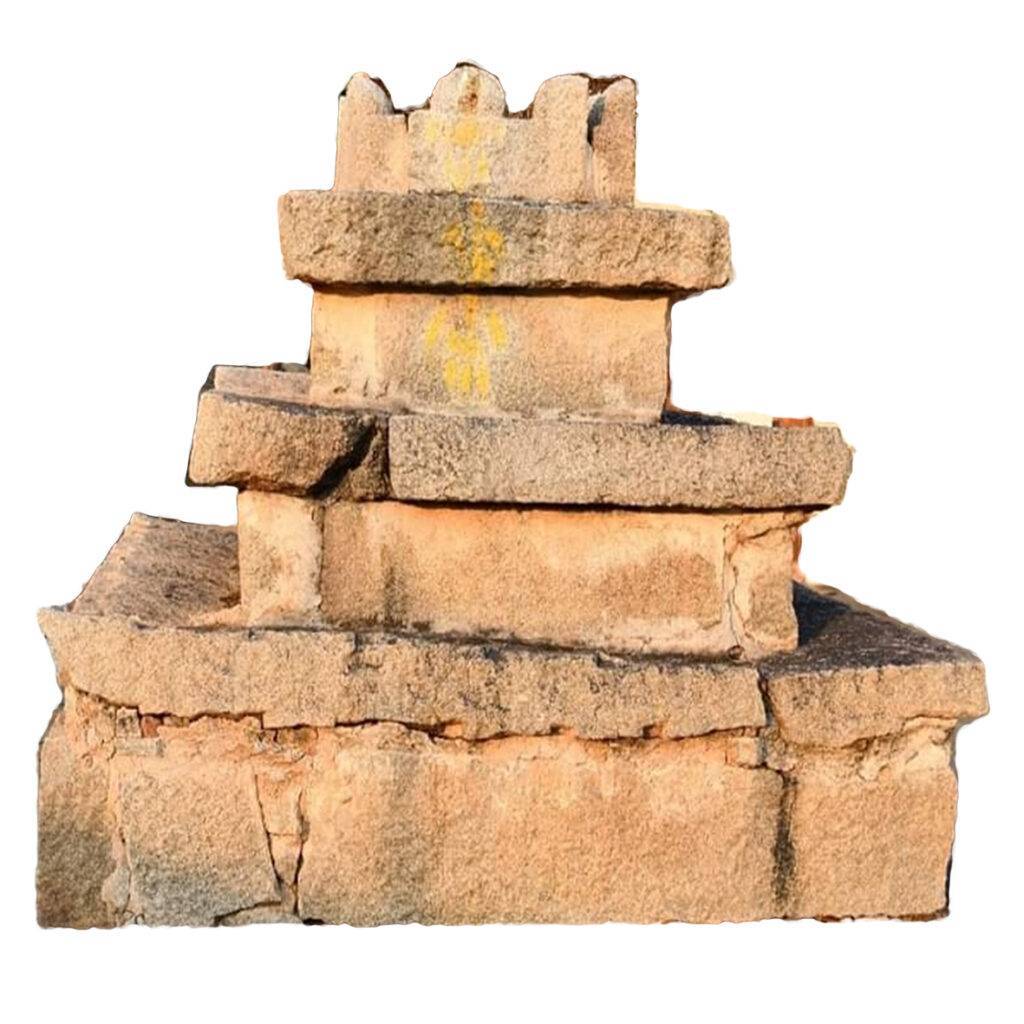


यदुनाथपदांभोजसंसक्तो हंसराण्मुदे |
श्रीनिवासगुरुर्भूयात् वासवीसूनुपूजकः||
Śrī Śrīnivāsa thirtha was ordained the 13th Pīṭhādhipati by Śrī Vyāsarāja Gurusārvabhaumaru. He was a worthy successor of the Sarvajñya Pītha of Rājendra Tīrthiya Pūrvadi Maṭha. His Mūla Vṛndāvana stands right behind the majestic Mūla Vṛndāvana of Śrī Vyāsarājaru in the Navavṛndāvana Gadde in Hampi. Tradition holds that spiritual knowledge dawns on a seeker that has reverence to his mentor (Guru Bhakti). It is as though that location of the Vṛndāvana itself stands as a testimony to the above fact.
Information available in existing literature reverentially refer to this Saint as “Sarvajñya Cūḍāmaṇi” exemplifying his great achievements. The Saint had immense knowledge on the different facets of Śāstra, which is not surprising considering the fact that he was spiritually groomed by the great Vyāsarājaru and was a recipient of his complete grace, besides having been a great tapasvin. The Saint is further eulogised as the spotless moon that emerged out of the ocean referred to as Vyāsarāja and was well-versed in the three compositions of Śrī Vyāsarājaru collectively called as Vyāsatraya (that is widely respected within the Indian philosophical circles).
A pen-picture of this Saint is condensed in the form of Āṣṭaka, eight Śloas, composed by his Śiṣya, and successor to the Pīṭhā Śrī Rāma Tīrtha. In the first Śloka, the Saint is eulogized as an incomparable one that had immense bhakthi on His Guru as well as complete renunciation (Virakthi), in spite of having had access to wealth and power by way of association with Vijayanagara Sāmrājya and right to worship Tirumala Śrīnivāsa. In the second Śloka, the background to his being ordained as the successor of Śrī Vyāsarājaru on the Pīṭha is mentioned. In a sabha adorned with stellar Śiṣyās. He was the one that came forward to expound Śrīmat Bhāgavata. This immensely pleased His Guru, Śrī Vyāsarājaru and paved the way for his succession. Having portrayed this incident, Śrī Rāma Tīrtharu sought his benediction to understand intricacies in such compositions. In the third Śloka, the Saint is mentioned to have had Upadeśa of Nṛsiṁha Mantra from Śrī Vyāsārajaru, who being an incarnation of Prahlāda himself was instrumental for the Prādurbhāva (advent) of Lord Nṝsiṁha and is prayed to bring the blessings of Lord Nṝsiṁha. In the fourth and fifth Ślokas, the Saint is mentioned to have expounded the exalted principles enshrined in the Brahma Sūtra Bhāṣya of Ācārya Madhva in the light of elucidations provided in the Tatvaprākaśikā Tīka of Śrī Zaya Ṭīrtharu and further expatiations available in the Tātparya Candrika, Ṭippaṇi of Śrī Vyāsarāyaru. He is hailed as ‘Uttama Guru’ that performed Upadeśa/ Bodhana of the above subject to his Śiṣyās right in front of his Guru’s Vṛndāvana seven times (!) and His blessings are sought to understand these principles! In the sixth Śloka, it is indicated that the Saint moved around in intellectual circles as the ‘Lion King’ to uphold and establish the supremacy of Tatvavāda and to set-aside other thought processes that were not in line with the vision of Lord Vedavyāsa, with the power he achieved by the Nitya Upāsana (daily worship) of ‘Vyāsa Muṣṭīs’ obtained by Ācārya Madhva. In the seventh Śloka, the Saint is extolled as the one that is capable of providing befitting guideline about living a righteous way of life, Dharmopadeśa, as is appropriate to the stature of aspirant that approached him: be him in any of the three states of life, Brahmacārin, Gṛhasta (or) a Yati. He is being prayed so that the aspirant may be bestowed blessings in accordance with his Varṇa (societal classification) and Āśrāma (state in life). In the eighth Śloka of the Aṣṭaka, Śrī Rāma Ṭīrtharu salutes the Saint wholesomely Trikarana: mind, speech and body, and indicates that one that utters the name of the Saint with Bhakti and Anusandhāna that his Āśrama Nāma , Śrīnivāsa Ṭirtharu was indeed bestowed by Śrī Vyāsarāja himself, will overcome all the difficulties in their life easily.
Śrī Rāma Tīrtharu concludes by mentioning that one who undertakes a daily recital, Pārāyaṇa of the Aṣṭaka composed by him, Vidyā Śiṣya of Śrī Śrīnivāsa Tīrtharu: Mūla Gopālakṛṣṇādi Sakala Paṭṭada Devatĕgal̤a Ārādhakaru, in all humility with devotion will have their dangers burnt to ashes as does cotton bales coming in contact with fire and pave the way to obtain spiritual knowledge that is real wealth.
Śrī Śrīnivāsa Tīrtharu exited his mortal coils as ordained in the Śāstrās through the Brahma Randhra right in front of the Mūla Vṛndāvana of Śrī Vyāsarājaru while doing a Pārāyaṇa of Tātparya Candrikā Grantha.
Source Vm
Previous (Shri Vyasa Teertharu) | Next (Shri RamaTeertharu)
| Math | Shri Vyasaraja Math, Kundapura |
| Name of the Swamiji | Shri Shrinivasa Teertharu |
| Period | 1539 - 1564 |
| Guru | Shri Vyasa Teertharu |
| Shishya | Shri Rama Teertharu |
| Poorvashrama Name | |
| Brindavan Located at | Nava Brindavan (Anegundi) |
| Aradana Month | Vaisakha |
| Paksha | Krishna |
| Tithi | Panchami |
